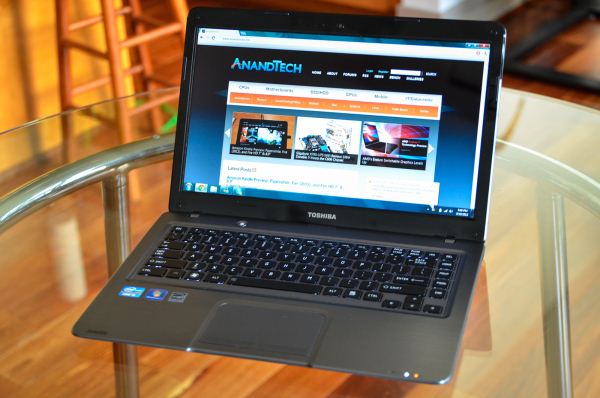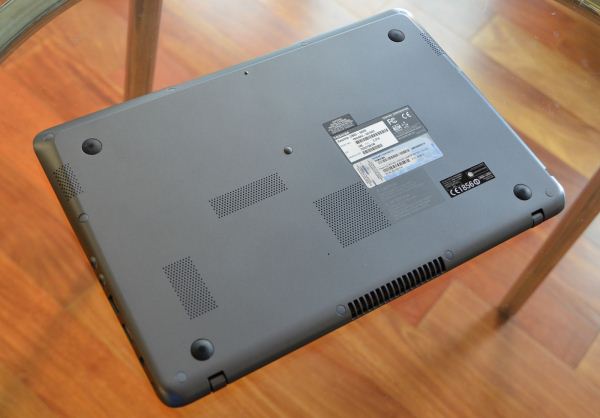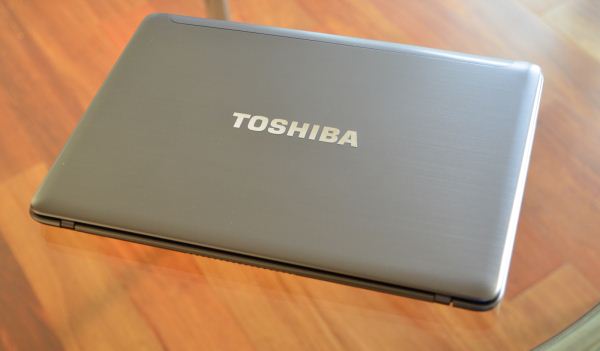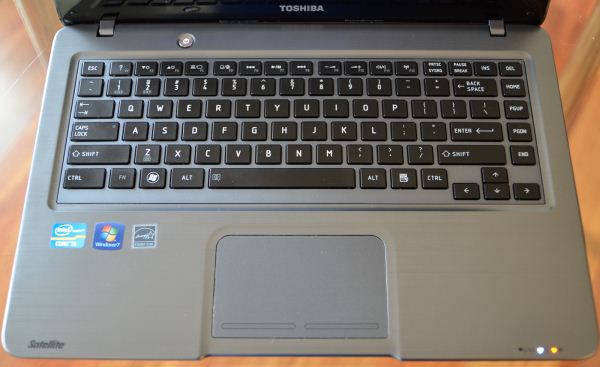Toshiba Satellite U845: Ultrabooks Go Mainstream
by Vivek Gowri on October 8, 2012 5:00 PM EST- Posted in
- Laptops
- Intel
- Toshiba
- Ivy Bridge
- Ultrabook
From a design standpoint, the U845 is pretty decent, and much better than I’m used to seeing from Toshiba. The chassis is made of exactly two pieces, just a top half and a bottom half, similar to the unibody style of notebook design. Unlike the traditional unibody, which has a wraparound top half and a bottom piece that mounts up to it (think of the panel on MacBook Pros that covers the entirety of the underside), the U845 has a panel on top that drops onto the wraparound bottom half. The bottom half is plastic, while the top panel is brushed aluminum, a treatment similar to what HP has done for their Envy Sleekbook/Ultrabook chassis (which also has the bottom unibody and top panel construction).
I suspect that it’s simply cheaper to have a plastic bottom unibody with a metal panel on top, because you still get the metal look and feel on the palmrests without having to actually carve the majority of the chassis out of a single block of metal. Having a simple aluminum plate means less material and less machining, which means way less cost. Once you start having to mill out openings for ports, I can completely understand how you would make a financially motivated decision to go with an injection molded plastic part, where creating the tooling is the major expense and things like material cost and machining are comparatively very minor.
The bottom is completely free of easy upgrade access ports, so I suspect that attempting to upgrade this system will be a pain—making the initial upgrade to 6GB memory probably worth it in the long run (though it would be nice to see an 8GB option as well). That’s actually the big downside in unibody designs, particularly ones with wraparound bottoms: you have to take two-thirds of the chassis off just to get access to basic memory and storage components. I thought the way Apple handled this with their unibody MacBook Pros was great, at least until they started making everything non-upgradable.
My chief complaint with the industrial design? The LCD bezel. It’s ridiculous; why companies feel the need to put a glossy black bezel around an already glossy display is something I continually find myself asking. It’s distracting, and it goes a long way towards cheapening the look.
The U845 aesthetic is mostly clean and inoffensive (notable exception: LCD bezel), but it doesn’t have the same premium look as many of the 13” Ultrabooks out there. Which is basically what I expected, but what really surprised me about this design was the build quality. It feels solid and well put together, which is unexpected because, let’s face it, this is a midrange Toshiba. No offense, but over the last half decade or so, the Satellite line hasn’t done a whole lot to inspire respect or confidence. The higher end Portege models have been decent, but the Satellites are a different story—they're generally mediocre systems that tend to be designed and built to standards lower than expected. The U845 is different, and that’s a very good thing.
The unibody construction has done wonders here, helping the entire notebook feel sturdier by having less parts to deal with, and the aluminum upper casing has done the job by keeping the palmrest and interior stable and flex-free. Overall, the system feels reassuringly weighty, and to be honest, I think it’s built better than the Samsung Series 5 Ultra. That’s an important step forward for Toshiba, being able to tout build quality in their midrange notebook products. I’m a fan.
The input device combination is a bit of a mixed bag, with a multitouch trackpad with Synaptics drivers and their standard suite of gesture support. The click is a bit firm for my tastes, but the pad itself is responsive and has good sensitivity. The keyboard is somewhat unfortunate—it looks and feels just like the keyboard from the R700, none of which is good. It’s stable enough in normal use, but it exhibits flex under pressure. The biggest issue is that the typing feel is pretty mushy. You get used to the absence of adequate feedback, but the lack of positive keypresses is still an issue for Toshiba, and the lack of improvement in that area over the last three years is rather disappointing. But other than the keyboard and LCD bezel, the hardware is surprisingly robust, a definite positive for Toshiba.














57 Comments
View All Comments
ccd - Monday, October 8, 2012 - link
If I want to consume media, I'm getting a tablet. If I want a machine to do office work, I need at least 15" screen which would also include a decent sized keyboard. Anything below 15", ultrabook or not, will soon become some form of tablet.teiglin - Monday, October 8, 2012 - link
Strongly disagree. For casual browsing on the couch, I much prefer a laptop to a tablet. From the options of an iPad, a Galaxy Tab 7.7, and an 11" Samsung Series 9, the Series 9 sees by far the most couch use.For "media consumption" (which is a pretty ambiguous term, but which I take to mean "watching TV shows/movies), a tablet may or may not be better--of course, on the couch, I generally use the TV, and when travelling, an ARM tablet tends to have the advantage thanks to battery life.
Personally, I tend to agree that the 13-14" form factors that seem to be the most common laptop screen sizes nowadays are not ideal; for me, 11" is more comfortable to use while lounging, and certainly stepping up in size gives you a more usable keyboard, but for any work involving actual typing, I find it hard to use any laptop keyboard at all--although I've never had a job that involved a lot of travel and typing concurrently, so I guess if you don't have the luxury of a real keyboard, it's just a matter of how much size you're willing to sacrifice to ease the weight of your carry-on.
Belard - Tuesday, October 9, 2012 - link
Dunno about you but, I'm on my iPad now.... Went from couch to toilet to bed... As Steve Jobs envisioned. My desktop is a few feet with a nice 24" display... But I'll type small messages like this on the tablet.You cannot hold a notebook like a book. You cannot share info on a notebook like you can on a tablet... As nAturally.
Different people like different things, each their own. I do use a tablet a bit more than my notebook, but desktop wins.
SodaAnt - Monday, October 8, 2012 - link
I disagree for a few reasons here. I think there's still plenty of space for a 11-13" ultrabook for on the go work. I can't do decent typing on a tablet, and unless I'm hauling around a lot, I'd rather not carry a 15" laptop. However, a light 11" ultrabook is perfectly fine for typing and writing up documents, and is also good for media consumption too.rwei - Tuesday, October 9, 2012 - link
Agree with this, and I've been flip-flopping. My 'portable' toolkit currently consists of an iPad 3 and a Thinkpad x120e.iPad is nice because the screen is purrty, and it barely weighs more than 1lb (don't need charger for anything up to a 2-day trip). Notable downsides include feeling like a tool.
However, the Thinkpad is nice because of the keyboard, being a real computer (full Office suite, MusicMonkey, browser), and (ironically, seeing as the iPad is the media device) of being more convenient for watching movies and music, since I don't have to convert everything (e.g. FLAC) and/or manage to a 32GB capacity. Then again, icky screen and >3x the weight w/ charger (5-6hr life isn't enough).
I'm always torn between which to bring. Bringing both would obviously be dumb.
Hopefully this resolves itself once Windows 8 hybrids launch and mature, to get me all the best functionality aspects of the Thinkpad in a more iPad-like package.
kaalus - Monday, October 8, 2012 - link
Must be a joke. Please stop even reviewing this crap. When someone soiled their pants there's no point looking in there.Conficio - Monday, October 8, 2012 - link
So many people don't need thin and don't need light. Especially not when you buy on a budget anyway. What users need and want is good screen, sturdy chasis with a keyboard with little/no flex, good trackpad.Even a good venting system that does not need cleaning every 6 mo or a hinge that survives more than 12 mo of light use, is more important than slim and light.
And in a 15" laptop add two 2.5" drive bays!
Conficio - Monday, October 8, 2012 - link
Actually meant to add, I'm not surprised they are not selling that well.Bob Todd - Monday, October 8, 2012 - link
The same thing passes through my mind on almost every Ultrabook review. Up at the ~$1000 range, these things are competing with higher end Windows laptops with quad core regular voltage CPUs, 8GB of RAM, dedicated GPUs, good build quality, and possibly an IPS panel or really strong TN (up to 1080p). And sadly the "regular" laptops that draw a lot more power aren't suffering in battery life since these Ultrabooks usually have freaking tiny batteries. Most of these haven't been good enough to be my only laptop, so I'll trade a little thinness and weight for a better overall package (e.g. Lenovo X230 all the way up to an Envy 15).10/100 Ethernet is a joke and these companies should be ashamed. Gigabit can't add much to the BOM in late 2012. It's far less frustrating when doing certain tasks (e.g. creating/restoring from images on the network, etc.), and not including it even at $600 is nuts. I could forgive some of this stuff if all of these Ultrabooks got 8+ hours of battery life. But as it stands, most of these aren't remotely compelling to me. I know why I see so many MacBook Airs in airports and so few Ultrabooks. The Air is a solid overall package, at least for the 13" (battery life, panel, SSD, etc.). There have been more impressive Windows "thin and lights" in the last few years than Ultrabooks. Hopefully they move the needle in the right direction for the average Ultrabook with the new models coming out and cheaper IPS/SSD component costs.
seapeople - Tuesday, October 16, 2012 - link
I agree on the battery thing - if a machine's entire purpose is to be extremely portable, then shouldn't one of it's best features be battery life?I've voiced this complaint before, and all I seem to get are replies of "But 6 hours is all you need! Assuming you close your laptop between meetings that should get you through all day at work, right?"